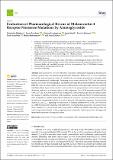Evaluation of pharmacological rescue of melanocortin-4 receptor nonsense mutations by aminoglycoside
Abstract
The melanocortin-4 receptor (MC4R) is critical for central satiety regulation, therefore presenting a potent target for pharmacological obesity treatment. Melanocortin-4 receptor mutations prevalently cause monogenetic obesity. A possibility of overcoming stop mutations is aminoglycoside-mediated translational readthrough. Promising results were achieved in COS-7 cells, but data for human cell systems are still missing, so uncertainty surrounds this potential treatment. In transfected HEK-293 cells, we tested whether translational readthrough by aminoglycoside Geneticin combined with high-affinity ligand setmelanotide, which is effective in proopiomelanocortin or leptin receptor deficiency patients, is a treatment option for affected patients. Five MC4R nonsense mutants (W16X, Y35X_D37V, E61X, W258X, Q307X) were investigated. Confocal microscopy and cell surface expression assays revealed the importance of the mutations' position within the MC4R. N-terminal mutants were marginally expressed independent of Geneticin treatment, whereas mutants with nonsense mutations in transmembrane helix 6 or helix 8 showed wild-type-like expression. For functional analysis, Gs and Gq/11 signaling were measured. N-terminal mutants (W16X, Y35X_D37V) showed no cAMP formation after challenge with alpha-MSH or setmelanotide, irrespective of Geneticin treatment. Similarly, Gs activation was almost impossible in W258X and Q307X with wild-type-like cell surface expression. Results for Gq/11 signaling were comparable. Based on our data, this approach improbably represents a therapeutic option.
Citation
Höpfner , F , Paisdzior , S , Reininghaus , N , Sohail , I , Scheerer , P , Annibale , P , Biebermann , H & Kühnen , P 2022 , ' Evaluation of pharmacological rescue of melanocortin-4 receptor nonsense mutations by aminoglycoside ' , Life , vol. 12 , no. 11 , 1793 . https://doi.org/10.3390/life12111793
Publication
Life
Status
Peer reviewed
ISSN
2075-1729Type
Journal article
Description
Funding: This research was funded by the Deutsche Forschungsgemeinschaft (DFG) (German Research Foundation) through SFB1423, project number 421152132, subprojects B02 to H.B. and P.K., A01 and Z03 to P.S., and C03 to P.A., and project numbers 430971019, 430970922 and KU 2673/6-1 to P.K., and by the European Union’s Horizon 2020 MSCA Program under grant agreement 956314 (ALLODD) to P.S.Collections
Items in the St Andrews Research Repository are protected by copyright, with all rights reserved, unless otherwise indicated.

